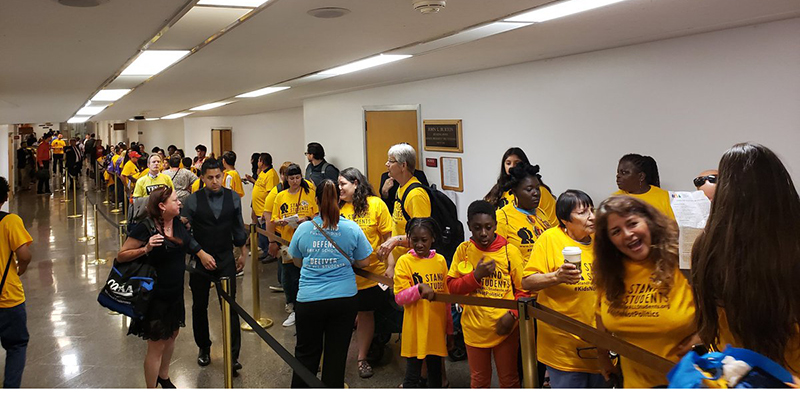California Charter School Regulations Pass Senate Education Committee After Marathon Session and Intervention by Gov. Newsom

After a seven-hour hearing and in a room inundated with advocates in color-coordinated T-shirts, the California Senate Education Committee narrowly passed two bills this week that will more strictly regulate charters, including giving local districts greater leeway to deny charter applications.
The sharply contested bills split the committee 4-3, with state Sen. Steve Glazer, a Democrat, siding with the committee’s two Republicans in opposition. The committee, which covered 25 bills during its day-long session, took several earlier votes on the charter bills that deadlocked 2-2 and then 3-3 before all seven members were present.
The two bills tighten restrictions on charter schools, which are publicly funded but independently operated, and will now advance to the Senate Appropriations Committee before moving to the Senate floor for a vote.
AB 1505, the more controversial of the two, would grant local districts more discretion to approve or deny new charter petitions and narrow the existing appeals process for denied applications. The Education Committee vote came after compromise language put forth by Gov. Gavin Newsom was put into the proposed regulations. The Assembly’s version would virtually eliminate the appeals process and give sole authorizing power to local districts, which often see charter schools as competition.
The two witnesses who spoke in support of the bill at Wednesday’s hearing before the vote — Cindy Marten, superintendent of San Diego Unified School District, and Dana Dean, director of the California School Boards Association — argued that AB 1505 is more democratic by giving local districts more control over the schools that operate within their boundaries.
“The charter school laws are outdated. This bill strengthens local control by providing school districts with more tools to evaluate how new charter schools will impact all students in the district, including financial impact,” said California Assemblymember Patrick O’Donnell in a statement. O’Donnell chairs the Assembly Education Committee and, along with Assemblymember Rob Bonta, introduced the measure to the committee on Wednesday.
After the vote, the California Teachers Association, the powerful state teachers union that co-authored AB 1505 and made limiting charter expansion central to teacher strikes in Los Angeles and Oakland earlier this year, took to Twitter to celebrate.
KIPP SoCal Public Schools, which operates 19 charter schools educating roughly 8,200 students in Los Angeles and San Diego, described the vote as legislators putting politics before students.
Opponents of the bill, mostly charter school advocates and families, also spoke at Wednesday’s hearing. Carlos Marquez, representing the California Charter Schools Association, and Caitlin O’Halloran, representing the Charter Schools Development Center, argued that AB 1505 could threaten the growth of high-performing charter schools. Both expressed caution at the bill’s allowance for districts to consider the financial impact charter schools would have on their budgets. This comes despite a new amendment to the legislation that would restrict financial considerations only to districts already under economic strain.
The bill would also allow districts to deny charter petitions if they too closely resemble existing school programs. That’s a problem for charter advocates who argue that existing programs that are failing students should be subject to competition from other charters.
“We find it unacceptable that AB 1505 grants districts broad discretion to deny new charters on the basis of running a similar program with no regard of whether the program is failing kids,” Marquez said at the hearing.
On Thursday, Myrna Castrejón, president of the California Charter Schools Association, released a statement, responding to the vote.
“We all agree that many of California’s students are not being well-served in our public schools today,” she said. “Let’s not sacrifice the needs of our most vulnerable students who are excelling in charter schools.”
The version of AB 1505 that passed the Senate Education Committee has some notable differences from the legislation that passed the Assembly. Last week, representatives from Newsom’s office introduced several amendments to the bill that softened some of its most restrictive elements.
While earlier versions of AB 1505 sought to eliminate the existing appeals process for denied charter petitions, the current version now allows an appeal to the county Board of Education and also to the state Board of Education — though only if the state determines that other authorizers abused their discretion.
Some of the new amendments in AB 1505 also come from a report by the state’s charter task force that Newsom convened, including extending the timeline by which districts need to approve charter petitions from 60 days to 90 days. Some measures, including ones allowing a district to consider whether a charter petition would be redundant, and one imposing a one-year moratorium on virtual charters, also come from the task force’s report, although they did not receive unanimous support from its members.
The new version of the bill includes criteria for when districts can deny renewal applications for existing charter schools as well. Unlike traditional public schools, charters in California must seek renewal status every few years. The current version of AB 1505 would prevent districts from denying a renewal application if the charter program made it to the highest two levels of state academic indicators. On the other hand, denial of a renewal application must be weighed for charter programs that measure in the lowest two levels of state academic indicators.
AB 1507 would close a loophole in the state’s current charter policy that allows some districts to boost their budgets by approving charter schools outside their boundaries. While considered less controversial than AB 1505, AB 1507 also saw long lines of advocates expressing support or opposition to the measure. At just over 1,300 schools, California has the most charter schools and charter school students of any state in the country.
While the passage of the bills in the Senate Education Committee represents a win for its supporters, both sides acknowledged that continued discussion is needed to reach a universally supported deal. More revisions to the legislation are expected before the final vote this fall. The state legislative session ends in September.
Marquez outlined several points within the bill that are still unacceptable to the California Charter Schools Association, including the limited appeals process and the criteria for charter schools applying for renewal. But, he noted at the hearing, “the window of opportunity to seek greater protections for our families and the schools they so cherish has not closed, and we will continue to work with the administration, author and proponents over the coming weeks to resolve outstanding issues.”
O’Donnell echoed that sentiment, saying in a statement, “I look forward to continuing conversations with the Governor’s office and others on the passage of this bill.”
Get stories like these delivered straight to your inbox. Sign up for The 74 Newsletter

;)
